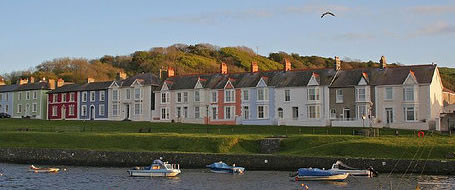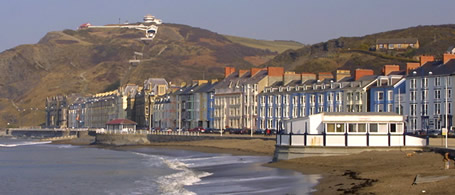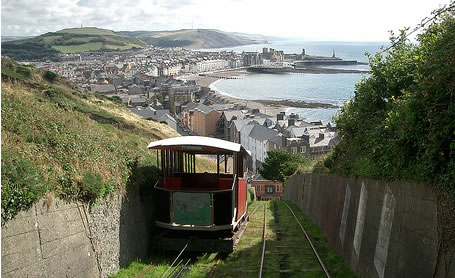As I have no classes this weekend, I decided to go to Aberystwyth today. The bus took about an hour and a half to get there and went through some nice scenery and some pretty villages and towns along the way. I particuarly liked Aberaeron, a small town by the sea with attractive Victorian houses painted in many different colours.

Er nad oedd dosbarthiadau heddiw, penderfynais i i fynd i Aberystwyth. Treuliodd y daith ar y bws tua awr a hanner ac aethon ni’n trwy gefngwlad hyfryd ac trwy nifer o drefi a phentrefi pert. Mae Aberaeron yn arbennig o ddeniadol, gyda llawer o dai Fictoraidd lliwgar.
In Aberystwyth I spent quite a bit of time wandering around the town and bought some Welsh CDs, a new Irish course, and another book of tin whistle tunes to add to my collection. There are some good bookshops in Aber, including one with French-Welsh and German-Welsh dictionaries, and courses for learning Breton and Irish through the medium of Welsh. They also had a Cornish course and dictionary.

Treuliais i maith o amser yn grwydro o gwmpas y dre a brynais i gryno ddisgiau gan Siân James, Gwenan Gibbard a Swci Boscawen, Cwrs Gwyddeleg newydd, a llyfr o diwniau ar gyfer y chwiban. Mae nifer o siopau llyfrau da yn Aber, yn gynnwys un sy’n gwerthu geiriaduron Cymraeg-Ffrangeg a Chymraeg-Almaeneg, a chyrsiau Llydaweg a Gwyddeleg trwy gyfryng y Gymraeg. Mae cwrs a geiriadur Cernyweg da nhw hefyd.
After having a look around the castle, I walked along the prom, and then went up Constitution Hill on the cliff railway. The views from the top were amazing – I could see more or less the whole of Cardigan Bay from the Llŷn Peninsula in the north to the Pembrokeshire Peninsula in the south. The sun even came out for a while and the clouds cleared making the view even better.

Ar ôl i mi gael cipolwg ar y castell, cerddais i ar hyd y promenâd ac es i i lân y Graiglais ar y rheilffordd y graig. Oedd y golygon i lawr y bryn yn ardderchog – o’n i’n gallu gweld Bae Ceredigion braidd i gyd o’r Llŷn yn y gogledd i’r penrhyn Sir Benfro yn y de. Disgleiriodd y haul am sbel a gwasgarodd y cymylau hefyd ac felly, oedd y golygon yn well.
On a semi-related matter, I received an email today from Steafan MacRisnidh, a speaker of Scottish Gaelic who is currently working in Japan. He has set up a new blog with some Gaelic lessons in Japanese. He also has a number of other blogs in Gaelic. Just though I’d mention it here.
As we usually have a quiz at the weekend, I don’t want to disappoint you today, so here it is:
Which of the following places is the odd one out?
Caerhirfryn, Caerliwelydd, Caerlŷr, Caernarfon, Caerfaddon, Caergrawnt, Caergaint, Caerwysg, Caerwrangon


